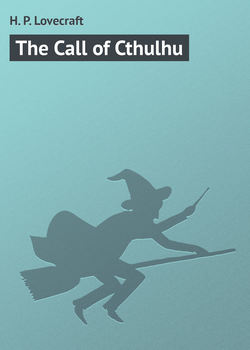The Call of Cthulhu

Реклама. ООО «ЛитРес», ИНН: 7719571260.
Оглавление
H. P. Lovecraft. The Call of Cthulhu
Introduction
I. The Horror In Clay
II. The Tale of Inspector Legrasse
III. The Madness from the Sea
Отрывок из книги
The most merciful thing in the world, I think, is the inability of the human mind to correlate all its contents. We live on a placid island of ignorance in the midst of black seas of infinity, and it was not meant that we should voyage far. The sciences, each straining in its own direction, have hitherto harmed us little; but some day the piecing together of dissociated knowledge will open up such terrifying vistas of reality, and of our frightful position therein, that we shall either go mad from the revelation or flee from the light into the peace and safety of a new dark age.
Theosophists have guessed at the awesome grandeur of the cosmic cycle wherein our world and human race form transient incidents. They have hinted at strange survivals in terms which would freeze the blood if not masked by a bland optimism. But it is not from them that there came the single glimpse of forbidden eons which chills me when I think of it and maddens me when I dream of it. That glimpse, like all dread glimpses of truth, flashed out from an accidental piecing together of separated things – in this case an old newspaper item and the notes of a dead professor. I hope that no one else will accomplish this piecing out; certainly, if I live, I shall never knowingly supply a link in so hideous a chain. I think that the professor, too, intended to keep silent regarding the part he knew, and that he would have destroyed his notes had not sudden death seized him.
.....
On the occasion of the visit, ran the professor’s manuscript, the sculptor abruptly asked for the benefit of his host’s archaeological knowledge in identifying the hieroglyphics of the bas-relief. He spoke in a dreamy, stilted manner which suggested pose and alienated sympathy; and my uncle showed some sharpness in replying, for the conspicuous freshness of the tablet implied kinship with anything but archeology. Young Wilcox’s rejoinder, which impressed my uncle enough to make him recall and record it verbatim, was of a fantastically poetic cast which must have typified his whole conversation, and which I have since found highly characteristic of him. He said, “It is new, indeed, for I made it last night in a dream of strange cities; and dreams are older than brooding Tyre, or the contemplative Sphinx, or garden-girdled Babylon.”
It was then that he began that rambling tale which suddenly played upon a sleeping memory and won the fevered interest of my uncle. There had been a slight earthquake tremor the night before, the most considerable felt in New England for some years; and Wilcox’s imagination had been keenly affected. Upon retiring, he had had an unprecedented dream of great Cyclopean cities of Titan blocks and sky-flung monoliths, all dripping with green ooze and sinister with latent horror. Hieroglyphics had covered the walls and pillars, and from some undetermined point below had come a voice that was not a voice; a chaotic sensation which only fancy could transmute into sound, but which he attempted to render by the almost unpronounceable jumble of letters: “Cthulhu fhtagn.”
.....